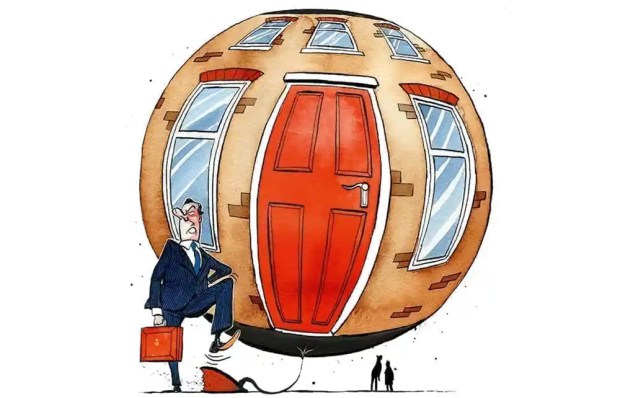I once commissioned Michael Wolff —currently the world’s most talked-about journalist as the author of the White House exposé Fire and Fury — to write for The Spectator. It was just before the 2004 presidential election in which Republican incumbent George W. Bush looked set to see off the Democrat challenger John Kerry, and I invited Wolff to tell us the implications for the stock market. His thesis was that the Democrats had become ‘the party of wealth and Wall Street’ while the Republicans had become ‘non-players’, Bush having turned his back on business to be ‘a God-squad cheerleader’. America was waiting in vain for a president who could ‘cast a spell of optimism over consumers and markets’.
Not even a mind as allegedly inventive as Wolff’s might have imagined that the president who would one day claim credit for a one-third rise in the Dow Jones index during his first year in office would be Donald Trump. ‘Six trillion dollars in value created!’ boasted the tweet — which also claimed incorrectly that recent weeks has seen the ‘record fastest 1,000-point move in history’.
In fact a comparable spike occurred at the height of the 1999 dotcom boom and I’m reminded of a conversation with a grand old Republican lawyer during Bill Clinton’s impeachment hearings, a year before that boom turned to bust. ‘Do you think the President’s behaviour has shamed your country?’ I asked. The answer came with a shrug: ‘The stock market’s doing just fine.’
Down on the farm
The farming community was hoping, until a few days ago, that Michael Gove might be moved to pastures new in the reshuffle that hardly happened on Monday. One Yorkshire neighbour of mine with a big muckspreader used to refer to the secretary of state for environment, food and rural affairs as ‘the Grim Reaper’. But in Gove’s speech to the Oxford Farming Conference last week, he seems to have pulled off the political trick of winning headlines about ‘delivering a Green Brexit’ that pleased the urban middle classes but might previously have had farmers reaching for their pitchforks — while in fact reassuring most of them that, contrary to previous indications, he has their interests at heart and understands the need to cut red tape, promote high standards and reward conservation in a balanced way.
Welcome news was that UK farm subsidies of £3 billion from Brussels will be matched until 2022, but in future will no longer be paid in proportion to size — a system that absurdly favours wealthy landowners such as the Duke of Westminster, Sir James Dyson and the racehorse breeder Prince Khalid bin Abdullah al Saud, without encouraging better practice. In a sector where the average farm is just 160 acres, few will object to that shift. More worrying was Gove’s talk of rewarding ‘public goods’, which many farmers fear means wider public access to their land as well as more acceptable objectives to do with bird and wildflower diversity. But Gove also talked about ‘supporting innovation, improving productivity [and] training a new generation of entrepreneurial young farmers’ — which is what smart farmers themselves care about most.
These days, farming is a highly scientific business that is gradually shifting from chemistry to biology in its quest for better results and is replete with acronyms such as ‘YEN’ — a pioneering crop yield enhancement network run by Adas, the Agricultural Development & Advisory Service. But progressive farmers are frustrated by public and political ignorance, and health scares such as the row over glyphosate, the key ingredient in the weedkiller Roundup, which the World Health Organisation declared ‘probably carcinogenic’ though several other reputable agencies disagreed. Gove, to his credit, was quick to take the right side of that argument: my neighbour also calls him ‘our new glyphosate champion’. Out of place as he may look in his green wellies in farm-visit photo ops, the minister can at least be confident he won’t get sprayed with FYM (that’s farmyard manure).
Man of parts
I asked Peter Sutherland — who I greatly admired and who died last weekend — which of his achievements made him most proud. Ireland’s most passionate pro-European was chairman at the time of BP and Goldman Sachs International but said little about either and (more understandably) nothing about his directorship of RBS. Instead he listed his leading roles in the creation of the World Trade Organisation and Europe’s Erasmus student exchange scheme, his record as a youthful attorney general of Ireland, and his continuing work as UN special representative on migration. He told me he had never aspired to a business career and did not think he would have prospered if he had chosen that path as a young man, rather than the Dublin bar. Nevertheless he had relished the challenges of BP, which included fierce arm-wrestling with the Russian oligarchs who were the oil giant’s joint venture partners.
He was a humanitarian and an inter-national negotiator first, a slightly reluctant corporate titan second. I suspect the least congenial milieu in his portfolio was the amoral money machine that is Goldman Sachs; so it’s ironic that his belated induction into the investment bank’s partnership brought him a nine-digit personal fortune.
Better than a tattoo
Here’s the best entry so far in last week’s competition for the most articulate justification, 100 words max, for following the example of the banker’s daughter who is a buyer of Bitcoin over the advice of her father, JPMorgan Chase chairman Jamie Dimon, that all Bitcoin investors are ‘stupid’. It comes from Bernard Kerrison: ‘Dimon’s daughter is right because annoying your father is what daughters do, while buying Bitcoin doesn’t leave lasting damage like a tattoo and is much cheaper than taking up with an unsuitable young man.’ More entries, please, to martin@spectator.co.uk.
Got something to add? Join the discussion and comment below.
Get 10 issues for just $10
Subscribe to The Spectator Australia today for the next 10 magazine issues, plus full online access, for just $10.
You might disagree with half of it, but you’ll enjoy reading all of it. Try your first month for free, then just $2 a week for the remainder of your first year.















Comments
Don't miss out
Join the conversation with other Spectator Australia readers. Subscribe to leave a comment.
SUBSCRIBEAlready a subscriber? Log in